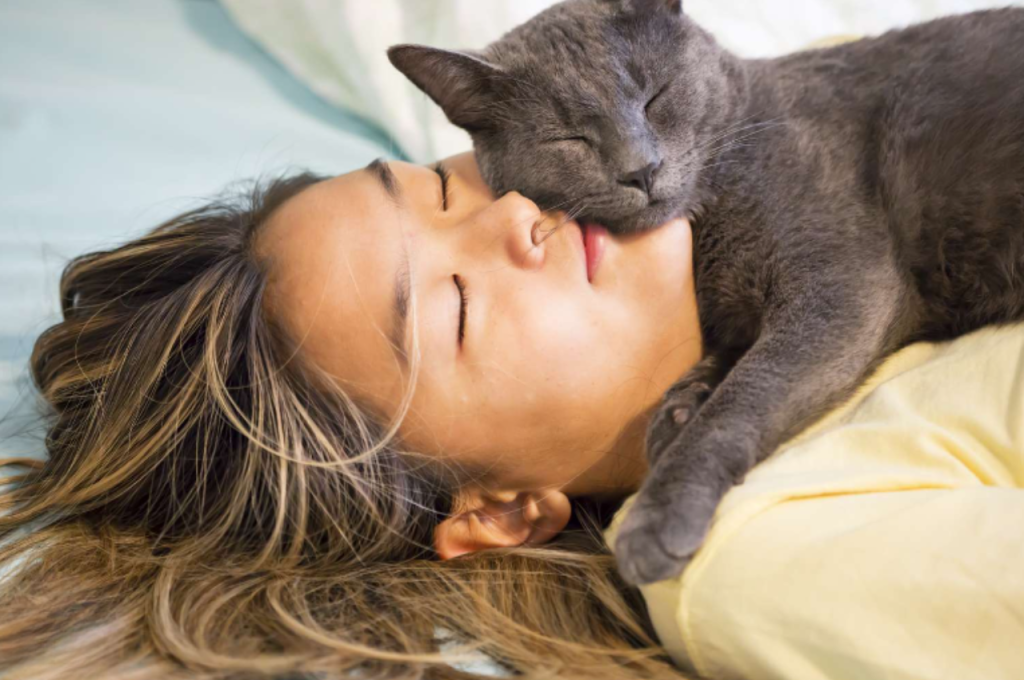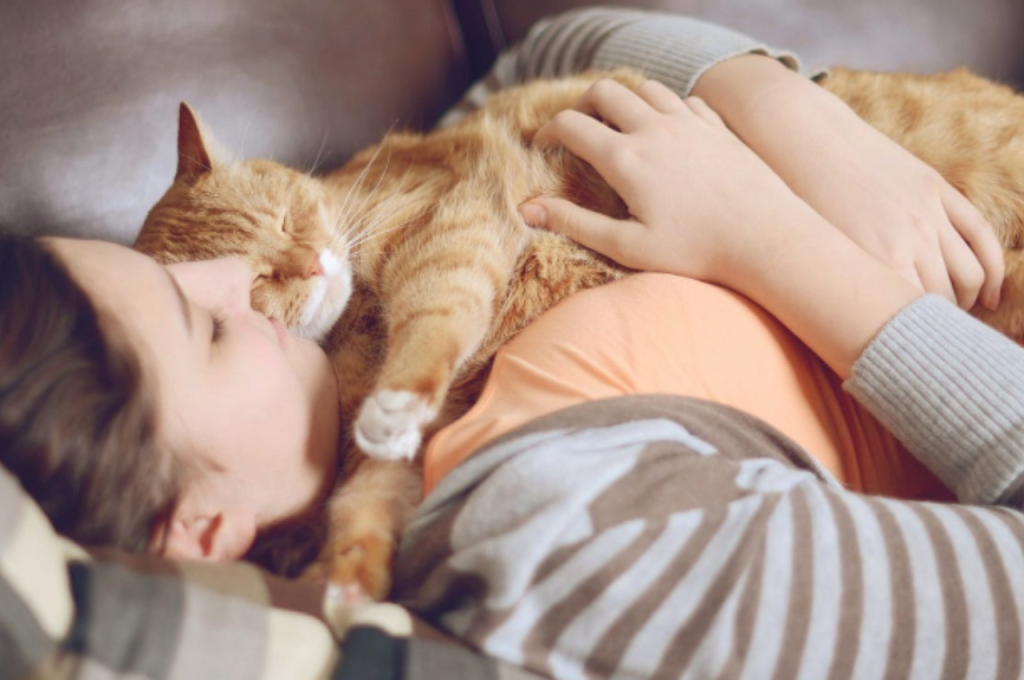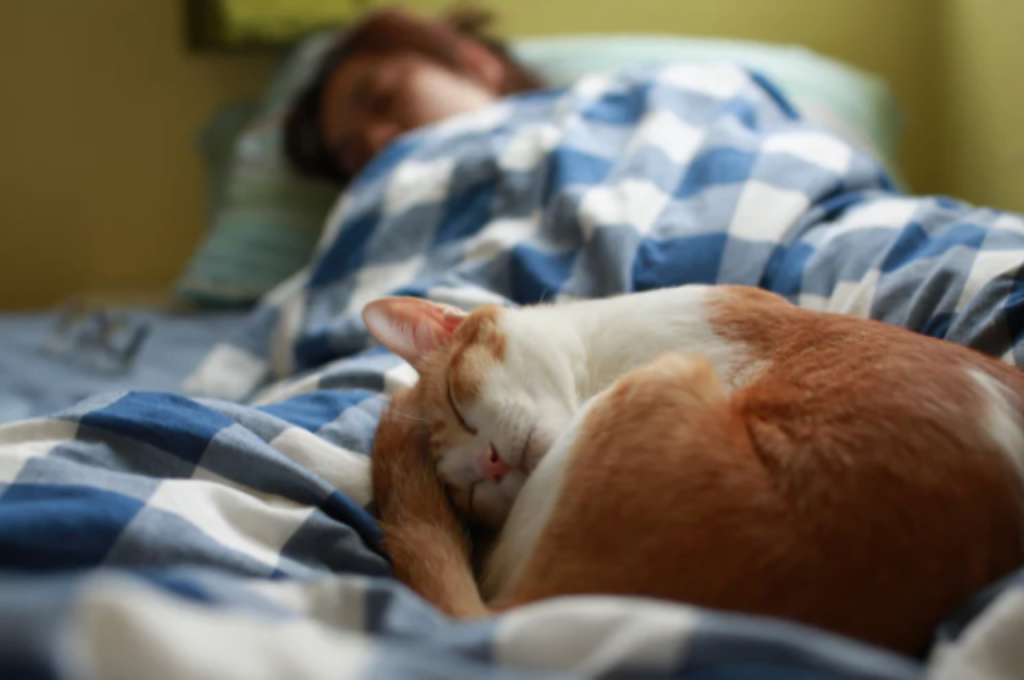Cats sleep on their owners because they love warmth and affection. When a cat sleeps on a person’s lap or chest, they feel secure and comforted by their owner’s presence.
It’s also an instinctual behavior from their wild ancestors, who would sleep together in groups to conserve warmth and protect each other from predators. As pets, cats still have this instinct but also view their human owners as members of their family or social group.
In addition to providing warmth and comfort, sleeping on their own may also indicate that the cat is feeling anxious or stressed. Cats are sensitive to changes in their environment and routine and may seek extra reassurance from their owners during these times. Ultimately, a cat sleeping on their owner is a sign of affection and trust and is often seen as a sign of the bond between the pet and their owner.
The Fascination of Cat’s Purring
Cats are fascinating creatures and their behavior often remains a mystery to their owners. One particular behavior that intrigues cat owners is their tendency to sleep on their owners. Some may wonder why their cats choose to sleep on them and not on their comfy beds!

Mystification Over Cat’s Purring
For cat lovers, the mystery of a cat’s purring is both comforting and fascinating. A lot of cat owners assume that cats purr when they’re feeling happy or content. To support this assumption, cats often purr while being stroked or petted. However, it’s not only limited to when they’re happy. Cats purr when they’re in pain, giving birth, during their final moments, etc. This means that there is more to purring than meets the eye.
- Some experts suggest that a purring cat can help reduce its anxiety or even lower the owner’s stress level.
- Another theory suggests that cats purr as a way to communicate with their owners and other feline friends.
- Furthermore, cats may purr as a means of self-healing because the frequency of the purring sound is within the range that assists in the healing of muscles, tendons, and bones.
Despite its many benefits, the phenomenon of purring has still not been fully understood by science.
The Science Behind Cat’s Purring
While the exact mechanism of a cat’s purring is still largely unknown, scientists have discovered that it is not produced by the vocal cords or by inhaling and exhaling like other sounds, but rather by the vibration of muscles near the cat’s vocal cords. Purring is primarily an involuntary action that occurs when a cat is both inhaling and exhaling.
Scientific studies on the sound frequencies of cats’ purrs have shown that they are within the range known to be therapeutic for bones and muscle growth, as well as aiding in the healing of soft tissues. As strange as it may sound, cats’ purring could be beneficial to their health and their owners as well!
Cat Sleeping Behavior on Their Owners
Have you ever wondered why your cat chooses to sleep on you instead of on your bed? This behavior might seem strange, but it is quite common among felines. Many cat owners experience this phenomenon where their furry companion chooses to sleep on top of them, even if it’s not the most comfortable spot. In this blog post, we’ll explore why cats sleep on their owners, specifically, their behavior towards us while sleeping.
Why do Cats Sleep on their Owners?
Cats are social animals: They thrive on interaction with their owners and will often seek attention and affection. Sleeping on their owner’s lap, chest, or even head is a way for them to feel close to you.

Cats Prefer Warmth: Since our bodies give off heat, they are naturally drawn to our body’s warmth. This is why you might notice your cat curling up to you in bed on a cold night.
The Psychological Need for Security and Territory
Cats have a psychological need for security and territory. They are naturally inclined to seek out safe and comfortable spaces to rest. If your cat prefers to sleep on you, it could be a sign that they feel safe and comfortable with you. Likewise, cats are territorial animals and enjoy marking their territory. Sleeping on their owner is a way for them to claim their space and assert dominance.
Types of Cat Purring and Behavioural Cues
Cats tend to sleep on their owners for warmth, affection, and protection. Different types of cat purring and behavioral cues indicate contentment and relaxation, which also explain their tendency to curl up on their human’s lap.
Cats are known for their purring sounds, which they make when they are happy and content. However, purring can also be indicative of various behavioral cues. Understanding the different types of purring can help you decipher what your cat is trying to tell you. In this section, we’ll discuss two distinct types of purring and their indicative behavioral cues: solicitation purring and attention-seeking content purring.
Solicitation Purring
Solicitation purring is typically the type of purring that cats make when they want something from you, such as attention or food. This type of purring is different from regular purring because it is often more urgent and louder.
Cats may also meow or nudge you with their paws to get your attention. If your cat is making this type of purring sound, it’s important to understand the underlying behavioral cues. Often, these cats are trying to communicate that they need something from you and are attempting to solicit your attention.
Attention Seeking Content Purring
On the other hand, content purring is a sign that your cat is happy and relaxed. In this scenario, your cat is likely to be soft and relaxed and display positive body language cues. They may close their eyes or look at you with half-closed eyes while making a purring sound. This type of purring is distinctive from solicitation purring as their body language indicates their happiness and joy rather than soliciting your attention.
Your cat may also display attention-seeking behaviors when they are contentedly purring, such as head bumps or rubbing against you. Understanding the different types of purring and behavioral cues can help strengthen your relationship with your furry feline friend. Knowing when they need your attention versus when they are happy and content can help you provide the right kind of affection, attention, or care that your cat needs.
How to Encourage Purring and Sleeping with Cats
Cats are known to be independent creatures. However, when it comes to sleeping, they often seek comfort and security. Sleeping on their humans can provide both. But beyond that, there’s a deeper reason why your feline friend may choose to snooze on your lap or chest.
Cats have a special affection for the people they love. They recognize their human scent and find comfort and safety while sleeping on them. Your cat may also be showing you affection while they are sleeping on you, a clear indication that they trust and love you. So, how can you encourage this behavior and bond further with your feline?
The Importance of Socialisation and Bonding
Socialization is critical to building a strong bond with your cat. Ensure to spend time talking to, petting, and playing with your cat. Cats love to feel included, and this will make them feel valued and appreciated. You can introduce games and toys that will make the bond between you and your cat stronger. The more your cat feels comfortable and included, the more likely they are to sleep near you.

Providing Comfortable and Secure Sleep Locations
Creating resting spots and comfortable places for your cat to sleep is essential if you want them to sleep near you. Cats enjoy warm, cozy, and secure sleeping places. You can create a comfortable and secure sleeping location for your cat that will encourage them to sleep near you using the following tips:
| 1. | Providing a comfortable bed: Get your cat a comfortable bed. Place it near or beside your bed. |
| 2. | Grooming your cat: Cats love to be well-groomed. Ensure to groom your cat regularly. Brushing and petting them can also serve as a bonding moment. |
| 3. | Creating a warm environment: Cats love warmth. Ensure that the temperature of the room they sleep in is warm enough. |
| 4. | Providing adequate water: Always ensure that your cat has enough water to drink. |
With these tips, you can create a secure and comfortable environment for your cat, encouraging them to snuggle close to you while they sleep.
Conclusion
It’s perfectly natural for your cat to sleep on you. It’s a sign of affection and trust. Your kitty feels safe and secure next to you. The sound of your heartbeat and warm body provide comfort and reassurance.
However, if you’re not getting enough sleep because of your furry friend, consider carving out a space for them nearby. With a little training, your cat will learn to love their new sleeping spot just as much as they love sleeping on you.
